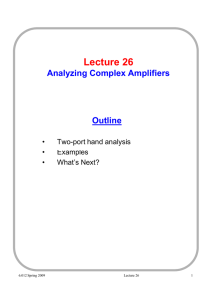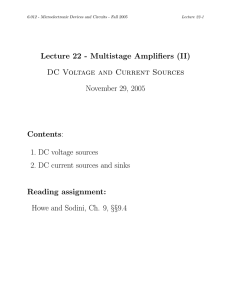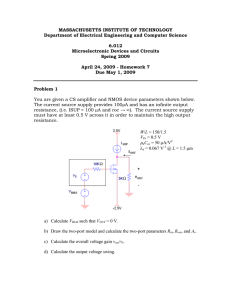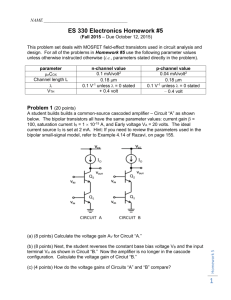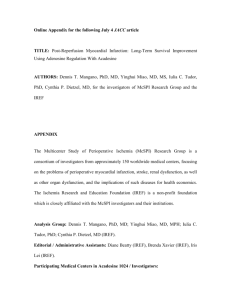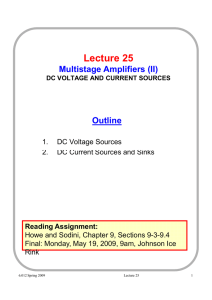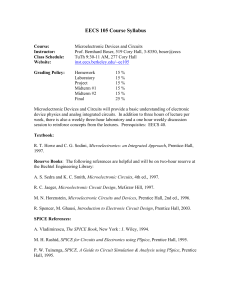Lecture Contents Reading Voltage and Current Sources
advertisement
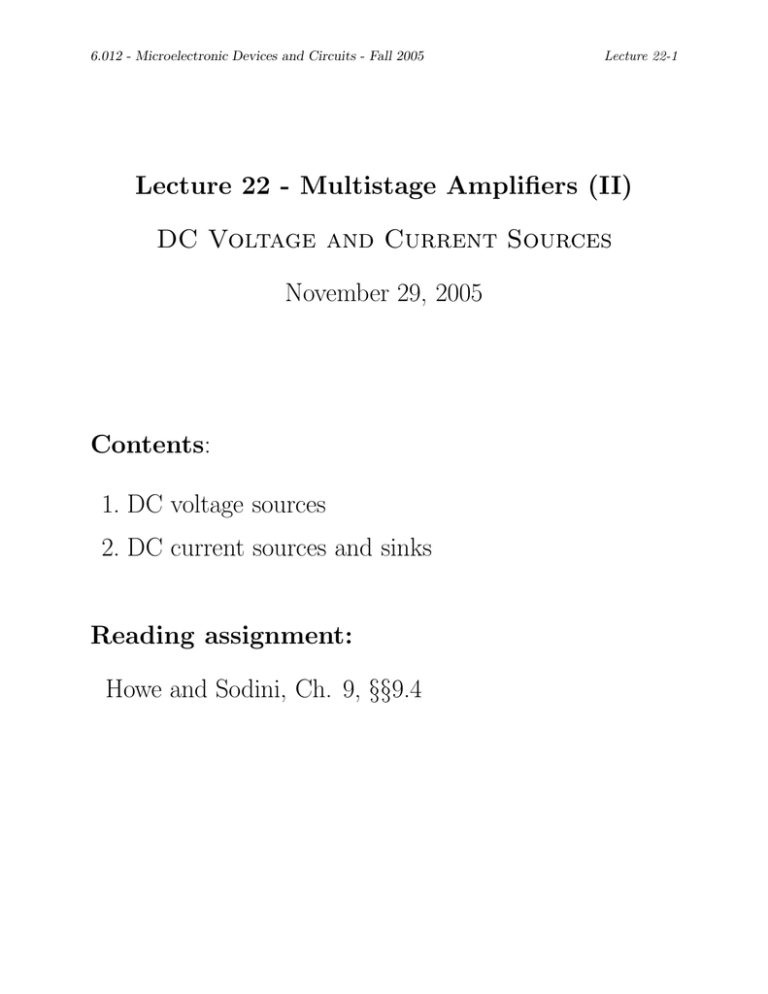
6.012 - Microelectronic Devices and Circuits - Fall 2005 Lecture 22-1 Lecture 22 - Multistage Amplifiers (II) DC Voltage and Current Sources November 29, 2005 Contents: 1. DC voltage sources 2. DC current sources and sinks Reading assignment: Howe and Sodini, Ch. 9, §§9.4 6.012 - Microelectronic Devices and Circuits - Fall 2005 Lecture 22-2 Key questions • How does one synthesize voltage and current sources? • How can this be done in an economic way? Lecture 22-3 6.012 - Microelectronic Devices and Circuits - Fall 2005 1. DC voltage sources 2 Features of voltage source: • A well controlled voltage • voltage does not depend on current drawn from source (low internal resistance). I-V characteristics of voltage source: I ideal real 0 0 VS V Equivalent circuit model of voltage source: RS + Vs - Lecture 22-4 6.012 - Microelectronic Devices and Circuits - Fall 2005 2 Consider MOSFET in ”diode configuration”: ID ID + VGS VDS + VGS − − VGS=VT 0 0 VT VDS I-V characteristics: ID = W W µCox (VDS − VT )2 µCox (VGS − VT )2 = 2L 2L Beyond threshold, MOSFET looks like ”diode” with quadratic I-V characteristics. Lecture 22-5 6.012 - Microelectronic Devices and Circuits - Fall 2005 2 How does one synthesize a voltage source with this? Assume a current source is available. iOUT VDD IREF iOUT iD + 0 VT vOUT vOUT − -IREF VGS = VDS takes value needed to sink current: ID = IREF + iOU T = W µCox(vOU T − VT )2 2L Then: iOU T = W µCox (vOU T − VT )2 − IREF 2L Solving for vOU T : vOU T IREF + iOU T = VT + W µCox 2L Lecture 22-6 6.012 - Microelectronic Devices and Circuits - Fall 2005 vOU T is function of IREF and W/L of MOSFET: • IREF ↑ ⇒ vOU T ↑ • W/L ↑ ⇒ vOU T ↓ iOUT iOUT W/L IREF VT VT vOUT −IREF1 vOUT −IREF −IREF2 2 Small-signal view of voltage source: D G + ro it + gmvgs vgs S Rout = Rout is small (good!). 1 1 //ro gm gm - vt 6.012 - Microelectronic Devices and Circuits - Fall 2005 Lecture 22-7 2 PMOS voltage source: VDD iOUT + IREF VOUT − Same operation and characteristics as NMOS voltage source. PMOS needs to be bigger to attain same Rout . Lecture 22-8 6.012 - Microelectronic Devices and Circuits - Fall 2005 2. DC current sources and sinks 2 Features of current source: • A well controlled current, • supplied current does not depend on voltage across (high internal resistance) I-V characteristics of current source: I real Is ideal 0 V 0 Equivalent circuit model of current source: Is RS Lecture 22-9 6.012 - Microelectronic Devices and Circuits - Fall 2005 2 Connect voltage source to another MOSFET: VDD IREF iOUT + M1 M2 + vOUT − VREF − ⎛ ⎞ ⎛ ⎞ IOU T 1 ⎜W ⎟ ⎝ ⎠ µCox (VREF − VT )2 2 L 2 IREF 1 W ⎜⎝ ⎟⎠ µCox(VREF − VT )2 2 L 1 Then: IOU T = W L 2 IREF W L 1 IOU T scales with IREF by W/L ratios of two MOSFETs (current (curr ent mirror circuit). Well ”matched” transistors important. Lecture 22-10 6.012 - Microelectronic Devices and Circuits - Fall 2005 • Small-signal view of current source: it + 1 gm1 + gm2vgs2 vgs2 ro2 - - Rout = ro2 I-V characteristics of NMOS current source: iOUT (W/L)2 IREF (W/L)1 1/ro2 VDS SAT2 vOUT vt Lecture 22-11 6.012 - Microelectronic Devices and Circuits - Fall 2005 2 PMOS current source • NMOS current source sinks current to ground. • PMOS current source ssources current from positive ources o supply. PMOS current mirror: VDD M2 M1 iOUT IREF Lecture 22-12 6.012 - Microelectronic Devices and Circuits - Fall 2005 2 Multiple current sources Since there is no DC gate current in MOSFET, can tie up multiple current mirrors to single current source: VDD M1 MR M2 M3 iOUT2 iOUT1 iOUT3 IREF IOU T n = W IREF WL n L R Similar idea with NMOS current sinks: VDD IREF MR + VREF − iOUT1 iOUT2 iOUT3 M1 M2 M3 Lecture 22-13 6.012 - Microelectronic Devices and Circuits - Fall 2005 2 Multiple current sources and sinks Often, in a given circuit, we need current sources and sinks. Can build them all out of a single current source: VDD M1 MR M2 iOUT1 iOUT2 iOUT4 IREF M4 M3 IOU T 1 = IOU T 2 = IOU T 4 = W IREF WL 1 L R W IREF WL 2 L R W IOU T 1 WL 4 L 3 = W W L 4 L 1 IREF W W L 3 L R Lecture 22-14 6.012 - Microelectronic Devices and Circuits - Fall 2005 2 Generating IREF : Simple circuit: VDD IREF IREF = R + VOUT − VDD −VOU T R VOU T = VT + IREF W µC ox 2L For large W/L, VOU T → VT : IREF VDD − VT R • Advantages: – IREF set by value of resistor. • Disadvantages: – VDD also affects IREF . – VT and R are function of temperature ⇒ IREF (T ). In real world, more sophisticated circuits used to generate IREF that are VDD and T independent. Lecture 22-15 6.012 - Microelectronic Devices and Circuits - Fall 2005 2 Can now understand more complex circuits. Examples: +2.5 V RS IREF vs + − VBIAS + − M3 M1 + M2 vOUT − −2.5 V Amp stages: What does it do? Lecture 22-15 6.012 - Microelectronic Devices and Circuits - Fall 2005 2 Can now understand more complex circuits. Examples: +2.5 V RS IREF vs + − VBIAS + − M3 M1 + M2 vOUT − −2.5 V Amp stages: What does it do? Lecture 22-16 6.012 - Microelectronic Devices and Circuits - Fall 2005 2.5 V RS IREF Vs + − VBIAS + − M3 What does it do? + RL M2 −2.5 V Amp stages: M1 vOUT − Lecture 22-16 6.012 - Microelectronic Devices and Circuits - Fall 2005 2.5 V RS IREF Vs + − VBIAS + − M3 What does it do? + RL M2 −2.5 V Amp stages: M1 vOUT − Lecture 22-17 6.012 - Microelectronic Devices and Circuits - Fall 2005 +2.5 V IREF RS vs + − VBIAS + − Q1 iOUT RL M3 M2 −2.5 V Amp stages: What does it do? Lecture 22-17 6.012 - Microelectronic Devices and Circuits - Fall 2005 +2.5 V IREF RS vs + − VBIAS + − Q1 iOUT RL M3 M2 −2.5 V Amp stages: What does it do? Lecture 22-18 6.012 - Microelectronic Devices and Circuits - Fall 2005 +3 V M2 M2B RS 6 kΩ vs + − VBIAS + − −3 V Amp stages: What does it do? M1 M4 iOUT + M3 RL vOUT − Lecture 22-18 6.012 - Microelectronic Devices and Circuits - Fall 2005 +3 V M2 M2B RS 6 kΩ vs + − VBIAS + − −3 V Amp stages: What does it do? M1 M4 iOUT + M3 RL vOUT − Lecture 22-19 6.012 - Microelectronic Devices and Circuits - Fall 2005 +2.5 V M4 M6 IREF RS vs M3 Q1 M5 VBIAS + − + − −2.5 V Amp stages: What does it do? Q2 + vOUT M2 − Lecture 22-19 6.012 - Microelectronic Devices and Circuits - Fall 2005 +2.5 V M4 M6 IREF RS vs M3 Q1 M5 VBIAS + − + − −2.5 V Amp stages: What does it do? Q2 + vOUT M2 − 6.012 - Microelectronic Devices and Circuits - Fall 2005 Lecture 22-20 Key conclusions • Voltage source easily synthesized from current source using MOSFET in diode configuration. • Current source easily synthesized from current source using current mirror circuit. • Multiple current sources and sinks with different magnitudes of current can be synthesized from a single current source. • Voltage and current sources rely on availability of well ”matched” transistors in IC technology.
